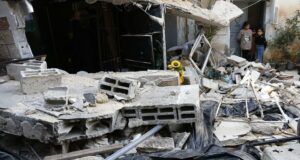The village of Shufa in Tulkarem has been without electricity for the sixth day in a row, after the municipality generators, which are the only power source for the village, burnt out.
Shufa has inexplicably been denied connection to the main electricity grid by Israeli authorities since 2001, despite the fact that all of the necessary towers and lines are in place. “Many times we have tried to take electricity from Tulkarem municipality or from Israel, but Israel will not allow” says a local resident.
Until six days ago, the village was supplied with electricity from the municipality-owned generators for six hours each day – from 6pm-12am; less if the price of diesel was high. The cost of the electricity they provided, however, was prohibitively high, at five shekels per kilowatt. In the city of Tulkarem, residents pay less than one shekel per kilowatt. This has forced residents to keep their power usage to a minimum, with monthly power bills regularly exceeding 500 shekels to run just lights and refrigerators for six hours each day. One resident of Tulkarem compared, “I have air-conditioning in the summer; heating in the winter; washing machine, everything, all 24 hours a day. And my bill is just 250 shekels each month”.
Now residents have no electricity at all. “I am sorry I cannot offer you cold water”, apologised one resident, Ahmad, “there is no electricity, so the refrigerator is not running. Yesterday my mother had to throw out all of the food. All of the chicken and meat from the freezer – it all went bad”. There is no knowing when there might be electricity again, as the Shufa municipality cannot afford the repairs to the generators. It is estimated that just to transport the generators to be repaired will cost 20 000 shekels. “I asked the head of the local council”, reported Ahmad, “He said, ‘really, I don’t know”.
While the village mosque, and a few of the wealthier residents have private generators, the rest of the village is dark at night. “If you come during the night, it is a tranquil place, like a cemetery.”
Whilst, lawfully, Israel should have no power to deny Shufa electricity, in practice, the power lines will necessarily pass through Area C – the areas of the West Bank that, since the 1994 Oslo agreement, are under full Israeli local government and security control. This denial thus begs the question as to why the Israeli authorities would do such a thing. The answer may lie in the strategic utility of the village, whose name “Shufa” refers to the fact that the village occupies a prime position for visibility of the surrounding areas. Many believe this is a strategy to drive the Palestinians from the village.
If this is the case, it is a strategy which is working. In the past five years it is estimated that more than 30 of the 150 families in the village have left, seeking a better life elsewhere. Prior to this, many villagers also moved from Shufa to Izbit Shufa – the lower part of the village, separated by a 1km road blocked at four points with earthmounds – because of the ease of life with electricity and viable transport options, which are denied to Shufa.
While the siege that plunged Gaza into darkness made news worldwide, Shufa suffers in silence. While Israeli authorities are currently dangling the promise of allowing Shufa to connect to the grid in December or January, villagers are not getting hopeful. “They say this all the time”, says Ahmad. “Always they are saying, maybe in one month, two months, three, you will have electricity. It never happens”. Until it does, the residents of Shufa may well continue to spend their nights by candlelight.
 International Solidarity Movement Nonviolence. Justice. Freedom.
International Solidarity Movement Nonviolence. Justice. Freedom.


